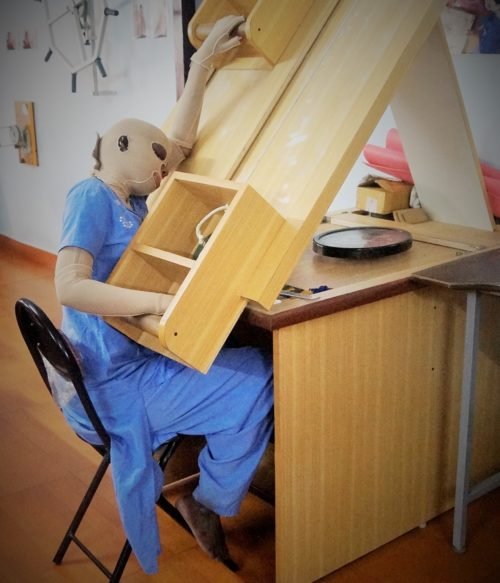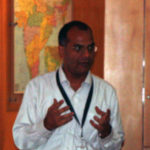21st November 2016 Chennai, India
Yashoda’s story: burn survivors of violence against women and the need for a support system

On Wednesday, I will launch British Deputy High Commission Chennai’s violence against women (VAW) project at Kerala’s Baby Memorial Hospital (BMH) in Kozhikode (Calicut). Here’s a great blog by Rudy Fernandez who’s leading on this project which we’re running across several Indian states over the next couple of months to support better government responses and more joined up medical care. It’s the first of 3 blogs on work we’re doing to support women.
Yashoda speaks so softly that we have to strain to hear: ‘In hospital, my face looked so scary that no one looked at me as a human being. But when the art therapist showed me to look beyond my burns I slowly began rediscovering myself.’
I’m in a small group hearing her explain why her experience was unique, her recovery more lasting.
Like Yashoda, thousands of burn survivors of VAW are scarred each year – with burns from kerosene, alcohol, acid, chemicals. What’s different about burns? Apparently, a lot. With no disrespect to survivors of other horrendous forms of VAW, she insists that burning is unique because it’s visible and, in spite of often miraculous reconstructive surgery, permanent.
Yashoda explains that a burn survivor’s battle is fought each day and on many fronts. She fights a physical battle each day even for the simplest of actions that we take for granted – seeing, feeling, hearing, speaking, eating, drinking, digesting, sleeping. Every day she fights an emotional battle to win back, hold on to love and support – from parents, spouse, siblings, children. If she’s compelled to support herself or her family she has to fight again to win and retain the confidence of educators or employers, who otherwise find her appearance too disconcerting, to teach or employ her.
Naturally when faced with a burn survivor most of us react first with horror, shock, repulsion, pity. That’s the easy part isn’t it? It’s harder to go beyond that. Some have. Yashoda says she owes her transformation to Chennai-based non-governmental organization (NGO), PCVC who provide holistic support to burn survivors of VAW. PCVC found that burn survivors, whether burnt by acid or not, need not only unique medical care but also unique and equally important post-medical care: sustained emotional, psychological, physical, social, economic support. Without this enabling of even struggling care-givers, survivors slip back into a cycle of violence or death, often self-inflicted. So, PCVC’s model evolved in partnership with first points of support – burns ward treating a ‘patient’ or police station registering a ‘victim’ complaint. And they created other points of support along the way to make recovery sustainable. They’ve seen success in Tamil Nadu where they’ve reached out to around 1,000 women survivors. In response, public and private institutions have bravely come together to provide new, creative solutions. Sankar Nethrayala for instance performs several eye surgeries free. And institutions such as Winners Bakery/Cafe, YRG, Gen-Lite, A New Organisation are training or employing survivors.
PCVC’s team point to Tamil Nadu as a leading example: Kilpauk Medical College and Hospital (KMCH) is arguably India’s only full-fledged burns block, as opposed to burns ward. The block framework ensuring that specialist knowledge, equipment, supplies are available round the clock to ensure the timely care, often critical in burn treatment: Pediatric Ward, Lab, X-Ray Room, Fumigating ICU, Physiotherapy, Dietician, Blood & Skin Bank, Plastic Surgeons and Nurses on call. All dedicated to burn care. Like KMCH, several others too have worked away from the media glare, quietly, efficiently improving the lives of survivors – state and central government burn wards, ICUs across India, police stations ‘attached’ to burn wards, National Burns Centre, Indian Journal of Burns, National Academy of Burns India.
I ask PCVC what more can be done. Our discussion throws up several questions: Can more burn wards, ICUs and skin banks be set up? Can all burn survivors receive adequate compensation and offenders receive adequate deterrent punishment, whether burnt by acid or not – after all, the damage to the individual is equal, why not compensation and deterrence? Can we form a network of public and private institutions who will educate, train and employ survivors? Or help provide specialist burn-care supplies such as pressure garments? Can other NGOs who help VAW survivors improve their knowledge and skills to help burn survivors with the crucial holistic psycho-social support they need long after medical care? Can we encourage a more holistic understanding of VAW? For instance, many self-inflicted burns are a direct result of a violent, abusive, alienating environment. Can we embed burns management into the curriculum of medical and nursing colleges?
These thoughts and the unique model in Tamil Nadu have now inspired a first of its kind initiative to develop a more integrated, sustainable support system for women and girls like Yashoda. I’m proud that the British Deputy High Commission in Chennai is supporting this initiative, led by PCVC, aimed at transforming these lives across India. PCVC is now widening baseline understanding of survivor experiences and in a few states to start with (Tamil Nadu, Telangana, Maharashtra, New Delhi) facilitating knowledge-sharing among practitioners, policy makers and evolving new guidance on holistic support to survivors.
 And Yashoda? Thanks to the counselling that helped heal her mental, emotional and psychological wounds, she bounced back: “When I lay helpless everyone said that I would become a burden on my parents. But I said ‘No, I will take care of them”. Now she’s happily employed but takes time off on weekends to share her experience with those who’ve just been admitted into the burns ward, struggling with the horror of what’s been done to them. They learn from each other. Seeing Yashoda smile even the ‘newest patient’ fighting searing pain takes courage, finds hope. Yashoda recalls how once a mother struggling to get her playful toddler to eat, would threaten ‘if you don’t eat this minute, scary Yashoda will come for you!’ The child would scurry back and eat, with one wary eye on a distraught Yashoda. Years later that child frolicked in Yashoda’s lap but, she warns ‘I wouldn’t have been there to enjoy that child’s enlightened affection if I hadn’t had the help I needed to live through my battles. It takes time and patience. But it can be done. I’m living proof!’
And Yashoda? Thanks to the counselling that helped heal her mental, emotional and psychological wounds, she bounced back: “When I lay helpless everyone said that I would become a burden on my parents. But I said ‘No, I will take care of them”. Now she’s happily employed but takes time off on weekends to share her experience with those who’ve just been admitted into the burns ward, struggling with the horror of what’s been done to them. They learn from each other. Seeing Yashoda smile even the ‘newest patient’ fighting searing pain takes courage, finds hope. Yashoda recalls how once a mother struggling to get her playful toddler to eat, would threaten ‘if you don’t eat this minute, scary Yashoda will come for you!’ The child would scurry back and eat, with one wary eye on a distraught Yashoda. Years later that child frolicked in Yashoda’s lap but, she warns ‘I wouldn’t have been there to enjoy that child’s enlightened affection if I hadn’t had the help I needed to live through my battles. It takes time and patience. But it can be done. I’m living proof!’
If you’d like to support this initiative or get involved please email Rudy Fernandez.

I hate violence against women,it feels so unfair imposing the force against a physically weaker human been.